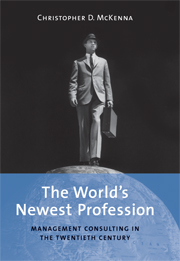Book contents
- Frontmatter
- Contents
- Series Editors' Preface
- Acknowledgments
- Introduction. Making a Career of Consulting
- 1 Economies of Knowledge: A Theory of Management Consulting
- 2 Accounting for a New Profession: Consultants' Struggle for Jurisdictional Power
- 3 How Have Consultants Mattered? The Case of Lukens Steel
- 4 Creating the Contractor State: Consultants in the American Federal Government
- 5 Finding Profit in Nonprofits: The Influence of Consultants on the Third Sector
- 6 The Gilded Age of Consulting: A Snapshot of Consultants Circa 1960
- 7 The American Challenge: Exporting the American Model
- 8 Selling Corporate Culture: Codifying and Commodifying Professionalism
- 9 Watchdogs, Lapdogs, or Retrievers? Liability and the Rebirth of the Management Audit
- Conclusion.The World's Newest Profession?
- Notes
- Index
2 - Accounting for a New Profession: Consultants' Struggle for Jurisdictional Power
Published online by Cambridge University Press: 18 August 2009
- Frontmatter
- Contents
- Series Editors' Preface
- Acknowledgments
- Introduction. Making a Career of Consulting
- 1 Economies of Knowledge: A Theory of Management Consulting
- 2 Accounting for a New Profession: Consultants' Struggle for Jurisdictional Power
- 3 How Have Consultants Mattered? The Case of Lukens Steel
- 4 Creating the Contractor State: Consultants in the American Federal Government
- 5 Finding Profit in Nonprofits: The Influence of Consultants on the Third Sector
- 6 The Gilded Age of Consulting: A Snapshot of Consultants Circa 1960
- 7 The American Challenge: Exporting the American Model
- 8 Selling Corporate Culture: Codifying and Commodifying Professionalism
- 9 Watchdogs, Lapdogs, or Retrievers? Liability and the Rebirth of the Management Audit
- Conclusion.The World's Newest Profession?
- Notes
- Index
Summary
When the editors of Fortune magazine published, in 1944, a feature on the increasing importance of management consulting, the article included a perfunctory description of the field's origins. As the Fortune writer explained, “its development in the U.S. started with Frederick W. Taylor, Henry L. Gantt, Harrington Emerson, and other pioneers of scientific management.” This first popular magazine article profiling management consulting in America set the presumed genealogy. Subsequent journalists, historians, and consultants would all presume the same lineage, pointing out that the early efficiency engineers “pioneered the use of scientific management principles” and, more generally, that the craze for scientific management predated the general rise of management consulting as a distinct subject. This presumed lineage, however, was based on circumstantial evidence and was misleading.
Instead of evolving from Taylorist firms, from the 1930s on, the leading management consultancies in the United States had little or no connection with scientific management. If the staff at Fortune had investigated the backgrounds of the eleven leading consultants whom they profiled in their 1944 article, they would have noticed that only one, Wallace Clark, had any ideological or institutional ties with Taylorism and, not coincidentally, only Wallace Clark & Company among those profiled had largely forsaken the United States, by the 1940s, to pursue clients in Europe. Although there was a connection in the United States between the modern form of management consulting and the development of Taylorism through their mutual involvement in cost accounting, that institutional legacy was less direct than casual observers have routinely presumed.
- Type
- Chapter
- Information
- The World's Newest ProfessionManagement Consulting in the Twentieth Century, pp. 26 - 50Publisher: Cambridge University PressPrint publication year: 2006

